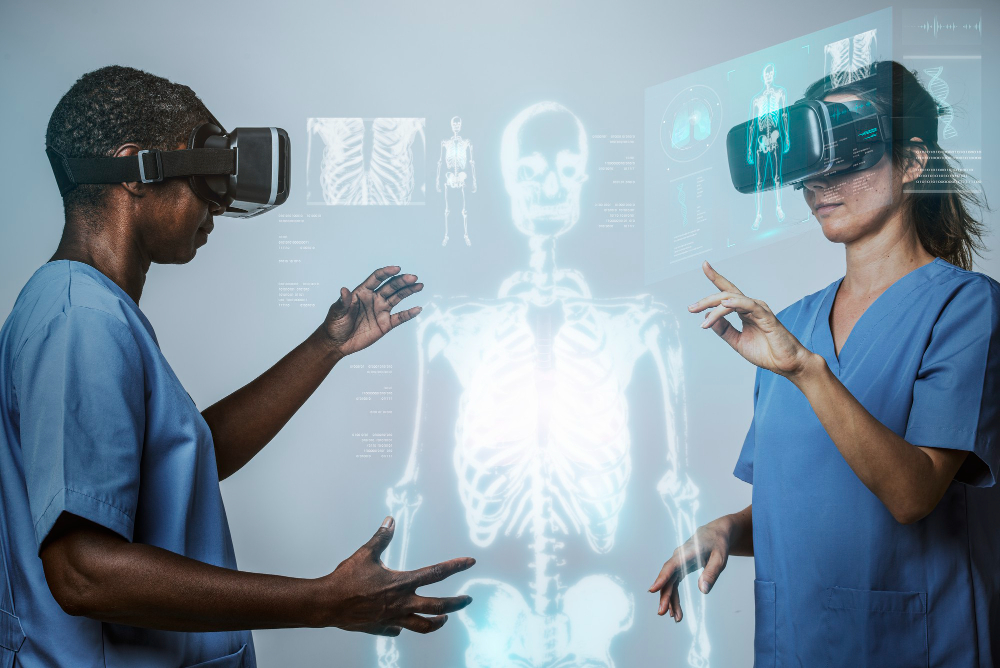Artificial Intelligence (AI) is rapidly transforming healthcare, revolutionizing how diseases are diagnosed, treated, and managed. From improving patient outcomes to streamlining operational processes, AI’s impact is profound. However, as with all technological advancements, it comes with its own set of opportunities and risks that need to be carefully considered. This article delves into the various ways AI is shaping the future of healthcare, discussing the incredible benefits, potential challenges, and what we can expect as AI continues to evolve.
Introduction: The Rise of AI in Healthcare
AI refers to the ability of machines to mimic human intelligence. In healthcare, AI leverages technologies such as machine learning, big data analytics, and natural language processing to process vast amounts of medical data. By assisting in diagnosis, treatment plans, and even administrative tasks, AI holds the promise of making healthcare more efficient, accurate, and accessible. However, as the technology advances, it raises important questions about privacy, ethics, and regulation, making it imperative for healthcare professionals and policymakers to address both the opportunities and the risks AI presents.
Opportunities of AI in Healthcare

1. Improved Diagnosis and Personalized Treatment
AI has the potential to revolutionize diagnosis and treatment, particularly in areas like cancer, heart disease, and chronic illnesses. AI algorithms analyze extensive patient data, including medical history, genetic information, and lab results, to provide more accurate and timely diagnoses. For example, AI-powered tools are already helping detect early-stage cancers, where early intervention can significantly improve patient outcomes. Furthermore, AI enables personalized medicine, tailoring treatments to the genetic makeup and lifestyle of individual patients, leading to more effective treatments with fewer side effects.
2. Predictive Analytics for Early Disease Detection
One of the most exciting prospects of AI in healthcare is its ability to predict and detect diseases at an early stage. By analyzing vast data sets, AI can identify patterns that human clinicians might miss, allowing for earlier interventions. For diseases like cancer and cardiovascular conditions, early detection is critical, and AI’s predictive capabilities can save lives by enabling proactive treatment and monitoring.
3. Medical Imaging and Radiology
AI has already made significant strides in improving medical imaging, enhancing the capabilities of tools like MRI and CT scans. AI algorithms can analyze images faster and more accurately than human radiologists, identifying abnormalities that might be overlooked. This leads to quicker diagnoses and more precise treatments. AI also facilitates the development of automated radiology tools, which can assist healthcare providers in diagnosing conditions with unprecedented speed and accuracy.
4. Virtual Health Assistants and Patient Care
AI-powered virtual assistants are transforming patient care by providing personalized recommendations, answering medical questions, and even scheduling appointments. These systems can alleviate the burden on healthcare providers, ensuring patients have quicker access to care. Virtual assistants also enable continuous monitoring of patient health, ensuring that medical professionals are alerted to any changes that require attention.
5. Accelerating Drug Discovery
The process of drug discovery, often long and costly, can be significantly accelerated with the help of AI. By analyzing vast data sets, including clinical trial results and genetic data, AI can predict which drug compounds are most likely to be effective. This reduces the time it takes to bring new drugs to market, helping to address pressing health issues more quickly. AI is particularly promising in areas such as rare diseases and personalized therapies, where traditional methods may fall short.
6. Cost Reduction and Operational Efficiency
AI is not only revolutionizing clinical practice but also transforming the operational side of healthcare. By automating routine administrative tasks like patient scheduling, billing, and record-keeping, AI reduces administrative burdens, allowing healthcare workers to focus more on patient care. Moreover, AI can optimize resource allocation, improving hospital operations and ensuring that care is provided efficiently and cost-effectively.
Risks of AI in Healthcare

1. Data Privacy and Security
As AI systems rely heavily on patient data, one of the most significant risks is the potential for data breaches and privacy violations. Patient data is highly sensitive, and AI systems require robust security measures to protect against unauthorized access. Healthcare providers must ensure that AI solutions adhere to strict privacy protocols to maintain patient trust and avoid breaches that could have severe consequences.
2. Bias and Discrimination
AI models are only as effective as the data they are trained on. If the data used to train AI algorithms is biased or unrepresentative, there is a risk that the AI system will make biased decisions. This can result in unequal healthcare outcomes, particularly for marginalized or underrepresented groups. For example, if an AI system is trained on data from predominantly one ethnicity, it may be less accurate for patients from other ethnic backgrounds. To mitigate this risk, healthcare providers need to ensure that AI systems are trained on diverse and representative data sets.
3. Over-reliance on Technology
While AI can enhance medical decision-making, there is a concern that over-reliance on AI could lead to the devaluation of human judgment. AI should be viewed as a tool that complements, rather than replaces, healthcare professionals. Medical professionals must maintain oversight of AI-generated recommendations and ensure that human expertise is still at the core of patient care decisions.
4. Regulatory and Ethical Challenges
As AI technology continues to evolve, regulatory frameworks must keep pace. Governments and healthcare organizations need to create clear guidelines to ensure the safe and ethical use of AI. This includes issues such as algorithm transparency, data usage, and AI accountability. Ethical considerations are also paramount, particularly regarding patient consent, the depersonalization of care, and ensuring that AI is used in a way that benefits all patients equally.
5. Integration with Existing Systems
Integrating AI into existing healthcare infrastructure can be complex. Healthcare providers face challenges in ensuring that AI tools seamlessly interact with electronic health records (EHR), billing systems, and other technologies. Without proper integration, the full benefits of AI may not be realized, and the risk of errors increases. Therefore, AI systems must be designed with interoperability in mind, ensuring they integrate effectively into existing workflows.
The Future of AI in Healthcare: What to Expect
As AI technology continues to evolve, its role in healthcare will only expand. Emerging technologies, such as deep learning and quantum computing, promise to unlock new possibilities in genomics, drug development, and personalized medicine. These advancements could lead to even more precise treatments and better patient outcomes. However, as AI becomes increasingly integrated into healthcare, it is essential that regulatory bodies and healthcare providers work together to ensure that ethical considerations, privacy concerns, and biases are addressed.
Additionally, the healthcare workforce will need to adapt. Rather than replacing human workers, AI will augment their capabilities. Healthcare professionals will work alongside AI systems, using them to gain deeper insights and provide better care. However, this will require ongoing education and training to ensure that the workforce is prepared to collaborate with advanced AI technologies effectively.
Conclusion: A Balanced Future for AI in Healthcare
AI in healthcare offers immense potential, from personalized medicine and improved diagnostics to cost-saving efficiencies and enhanced patient care. However, it also presents significant challenges, including data privacy, bias, and ethical concerns. As AI continues to advance, it is crucial that healthcare providers, policymakers, and developers collaborate to address these issues and ensure that AI is used responsibly and ethically.
The future of AI in healthcare is bright, but it requires careful management of its risks. By fostering innovation, ensuring inclusivity in data, and implementing robust regulations, AI can truly revolutionize healthcare, improving patient outcomes and transforming the entire industry for the better.


